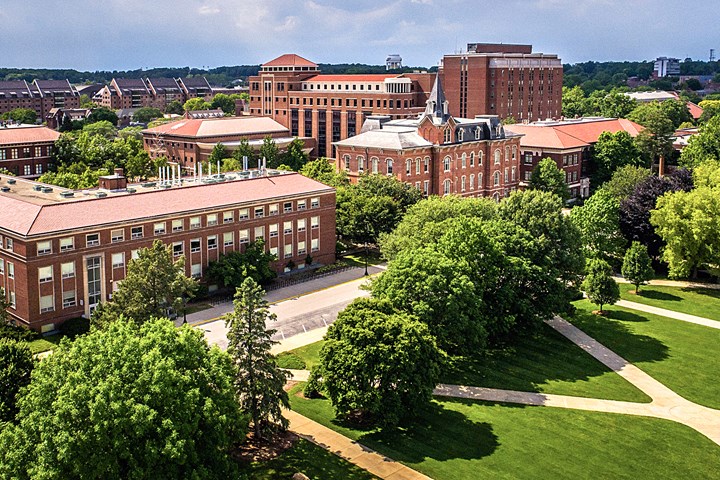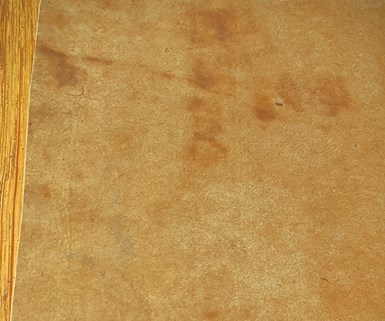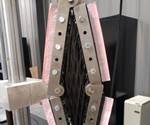Purdue develops lignin extraction method for sustainable composite board resin binder
The extraction method reduces production cost, long-term health hazards and can be used as the main component in a non-formaldehyde binder system.

Source | Purdue University
Purdue University (West Lafayette, Ind., U.S.) reports that its researchers have developed a lower-cost, sustainable and greener method for producing composite boards, a method that Purdue says is already seeing growing support from major industry players like high-pressure laminates distributor Wilsonart (Temple, Texas, U.S.), and CalPlant (Willows, Calif., U.S.), an agrifiber-focused company that produces rice straw-based medium-density fiberboard.
The company says that fabrication of many composite boards requires the use of formaldehyde-based resin binders that are released into the home environment over time, posing significant health hazards since formaldehyde is a known carcinogen.
“With our method, we take non-food-based biomass such as wood chips, sawdust or rice straw, and put it through a process to extract lignin-like material that can then be used as the main component in a non-formaldehyde binder system for composite boards,” says James Caruthers, Purdue’s Gerald and Sarah Skidmore Professor of chemical engineering. “Our method is sustainable and green because lignin is a waste byproduct and one of the most abundant biopolymers on Earth.” Tests using the Purdue team’s method showed that the combination of lignin-based resin with cellulosic fibers in matrix with the cross-linkable variations produced composite boards with desirable physical properties.

Purdue’s composite board produced with a non-formaldehyde binder system. Source | Purdue University
In addition to working with Purdue Research Foundation Office of Technology Commercialization (OTC) to patent the fiberboard technology, the research team and OTC have been working with CalPlant and Wilsonart to bring the Purdue technology to the market. Purdue says the team is looking to commercialize the method for use in the production of composite boards, where there may be other applications such as adhesives, detergents, abrasive product making, filter paper and many other products. Wilsonart’s director of technology operational excellence, Mahesh Subramanian, notes that preliminary tests of Purdue’s technology have already demonstrated its viability as a saturating-type resin, and has potential sustainability advantages for Wilsonart’s sourced fiber boards when used as a glue binder and as resin extensions.
The university notes its composite board binder technology also received funding from the Trask Innovation Fund, a development program established to support projects that advance the commercial value of Purdue intellectual property.
“A cost analysis shows a cost reduction over current formaldehyde-free composite board production when fabricating medium-density fiber boards,” Caruthers says. “This technology provides a low-cost sustainable, green method for producing composite boards that could deliver higher margins to composite board manufactures, while at the same time reducing long-term consumer exposure to formaldehyde.”
The functional lignin derivative also has established characteristics aiding antifungal and flame-retardant characteristics, offering future avenues for chemistry to perfect. The other residual part of lignin derivatives separated is cleaner wood and opens the door for cellulosic opportunities.
The researchers are looking for additional partners to continue developing their technology. For more information on licensing and other opportunities, contact Dipak Narula of OTC at dnarula@prf.org and mention track code 2020-CARU-68907.
Related Content
-
Evolving natural fiber technology to meet industry sustainability needs
From flax fiber composite boats to RV exterior panels to a circularity model with partnerships in various end markets, Greenboats strives toward its biomaterials and sustainable composites vision in an ever-changing market.
-
KCARBON and KIST develop lyocell/PLA/wood biocomposites
Initial demonstration in furniture shows properties two to nine times higher than plywood, OOA molding for uniquely shaped components.
-
JEC World 2024 highlights: Glass fiber recycling, biocomposites and more
CW technical editor Hannah Mason discusses trends seen at this year’s JEC World trade show, including sustainability-focused technologies and commitments, the Paris Olympics amongst other topics.













.jpg;maxWidth=300;quality=90)


